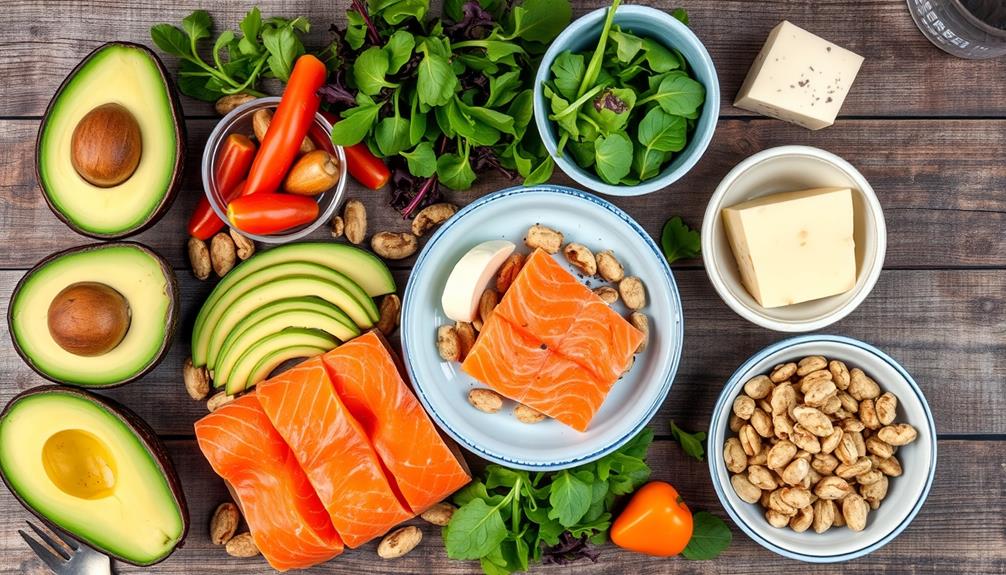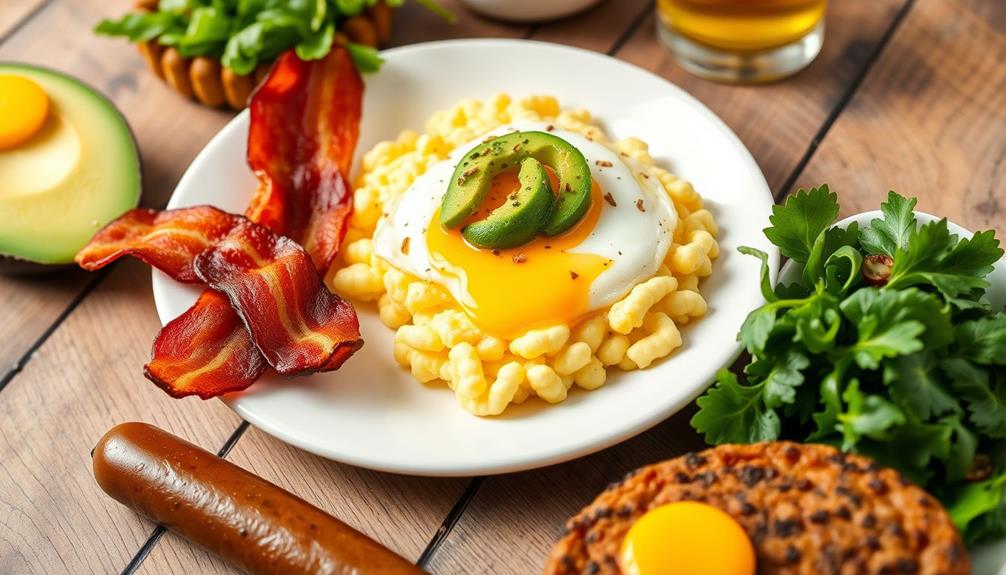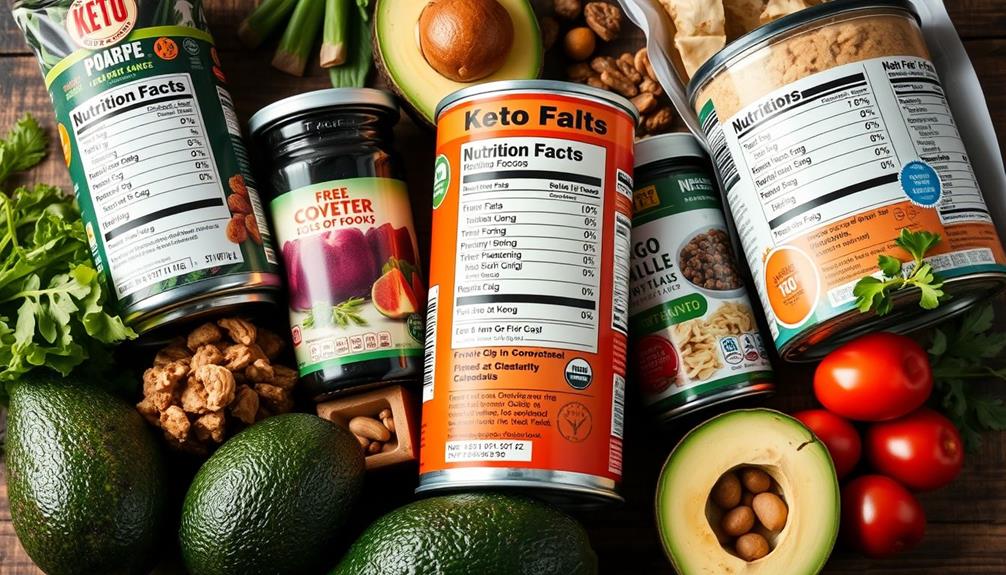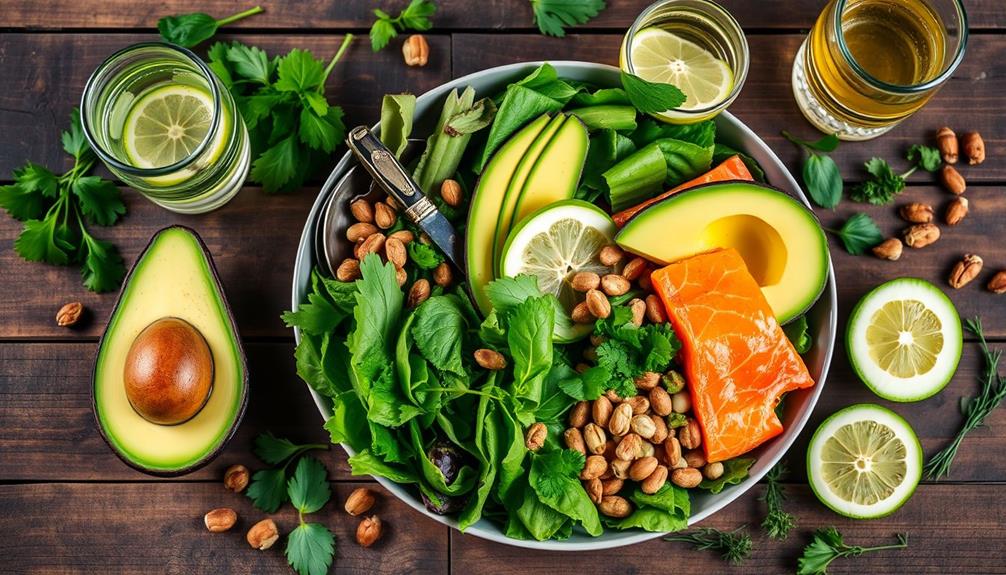On a keto diet, you'll typically want to consume between 1,000 and 1,500 calories per day. Focus on a macronutrient ratio that looks like 75% fats, 20% protein, and just 5% carbohydrates. This setup helps you achieve ketosis, which is vital for burning fat effectively. To lose weight, you need a calorie deficit of about 500 to 750 calories, so tracking what you eat is essential. Your exact needs will depend on factors like age, gender, and activity level. Keep exploring for more tips on optimizing your keto journey.
Key Takeaways
- The typical caloric intake on a keto diet ranges from 1,000 to 1,500 calories per day for weight loss.
- A calorie deficit of 500-750 calories daily is crucial for effective weight loss on the keto diet.
- Macronutrient ratios on a keto diet are approximately 75% fat, 20% protein, and 5% carbohydrates.
- Individual caloric needs vary based on factors like age, gender, metabolism, and activity level.
- Tracking daily caloric intake and adjusting based on energy expenditure can enhance weight management success.
Overview of the Keto Diet

The ketogenic diet, often simply called keto, is a low-carb, high-fat eating plan designed to shift your body's metabolism from burning carbohydrates to burning fat for fuel. This diet typically consists of 70-80% healthy fats, 10-20% moderate protein, and only 5-10% low carbohydrate intake.
By drastically reducing your carbohydrate intake to less than 50 grams per day, you can enter a metabolic state known as ketosis, where your body efficiently burns fat for energy. Incorporating a balanced diet rich in healthy fats while being mindful of your caloric intake is vital for long-term success on the keto diet, as highlighted in effective strategies for weight loss.
Originally developed in the 1920s for epilepsy treatment, the ketogenic diet has become popular for weight loss and its potential health benefits, like improved insulin sensitivity.
To maintain weight or achieve weight loss on the keto diet, it's important to closely monitor your caloric intake and macronutrient ratios. You'll rely on healthy fats from sources like avocados, nuts, and oils while avoiding high-carb foods like grains and sugars.
Tracking your calories daily and adjusting your diet helps guarantee you stay in ketosis, suppressing hunger and cravings. Embracing this lifestyle means understanding the importance of each food choice you make and how it affects your journey toward your health goals.
Caloric Needs for Weight Loss

Maintaining a calorie deficit is essential for effective weight loss on a ketogenic diet. To achieve this, you should aim to consume 500-750 calories less than your daily energy expenditure. A caloric intake of 1,000-1,500 calories per day can help you shed pounds, depending on your metabolism and activity levels.
Understanding key concepts such as budgeting your intake for different macronutrients can also enhance your dietary success.
To optimize your weight loss journey, consider the following:
- Track your basal metabolic rate (BMR) to understand your caloric needs.
- Focus on high-fat foods while being cautious of their calorie density.
- Maintain a balanced intake of macronutrients: about 75% fat, 20% protein, and 5% carbohydrates.
- Regularly monitor your daily calorie burn to adjust your caloric intake.
- Verify your protein intake supports muscle retention during weight loss.
Caloric Intake for Weight Maintenance

Achieving a stable caloric intake is essential for weight maintenance on a ketogenic diet. Your personalized caloric needs depend on factors like age, gender, and physical activity. Generally, females may require around 1,600-2,400 calories, while males might need 2,000-3,000 calories daily.
To help you visualize this, here's a quick breakdown of caloric intake based on activity level:
| Activity Level | Recommended Calories |
|---|---|
| Sedentary | 1,600 – 2,000 |
| Lightly Active | 1,800 – 2,200 |
| Moderately Active | 2,000 – 2,400 |
| Very Active | 2,400 – 3,000 |
| Highly Active | 2,600 – 3,200 |
Maintaining weight on a ketogenic diet means balancing your caloric intake with your energy levels and physical activity. Regular monitoring is vital, as it supports metabolic functions and can lead to benefits like lower blood pressure. By understanding your body's unique needs, you can successfully manage your body weight while enjoying the advantages of the keto lifestyle.
Importance of Calorie Tracking
Calorie tracking plays an essential role in your success on a ketogenic diet. It helps you maintain a calorie deficit, which is vital for effective weight loss, especially since high-fat foods can be calorie-dense and lead to unintentional overeating.
By monitoring your caloric intake, you can guarantee that you're not exceeding your daily limits while still enjoying the richness of keto-friendly foods. Additionally, understanding the risks and rewards of various investment strategies can help you make informed choices about your overall financial health, just as calorie tracking informs your dietary choices risks and rewards of Bitcoin IRAs.
Consider these benefits of calorie tracking:
- Awareness: Keep tabs on your caloric intake to avoid surprise overeating.
- Mindful Eating: Encourage thoughtful choices and curb cravings by knowing what you consume.
- Physical Activity: Balance your caloric intake with your energy expenditure for successful weight management.
- Effective Weight Loss: Aim for a deficit of 500-750 calories burned daily to promote steady weight loss.
- Adaptability: Adjust your intake based on your body's needs and your activity levels.
Resources and References
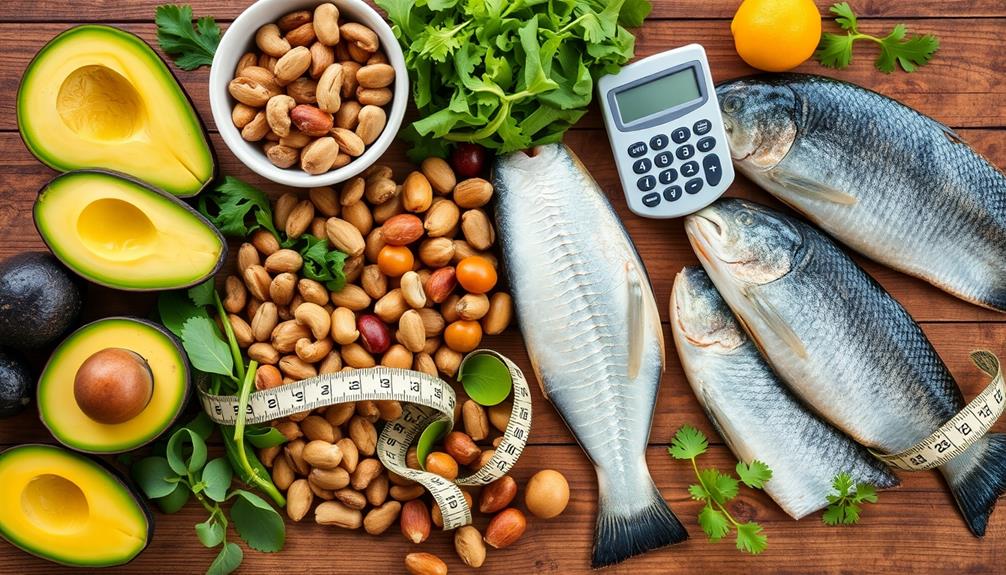
Effective calorie tracking is just one aspect of steering your ketogenic journey, but having reliable resources and references can further enhance your understanding and success. To effectively manage your caloric intake on a ketogenic diet, consider consulting research published in the Journal of Obesity & Metabolic Syndrome. This resource discusses ideal diet strategies for maintaining a caloric deficit, essential for weight loss.
Additionally, incorporating strategies like diversifying your investment portfolio with assets such as gold can provide a stable financial foundation, allowing for more focus on dietary goals, especially in times of economic uncertainty, as seen in Gold IRAs.
The Body Weight Planner is another invaluable tool. It helps you determine your daily caloric needs based on your age, gender, and activity level, ensuring you adhere to the right balance of protein and fat. You'll find that the ketogenic diet typically consists of 70-80% fat, which serves as your primary energy source.
Additionally, the International Journal of Obesity explores appetite changes during weight loss on keto, revealing how this low-carb diet effectively suppresses hunger. This can aid in sticking to your caloric intake guidelines while enjoying the health benefits that come with it.
Frequently Asked Questions
How Many Calories Should I Eat on a Keto Diet?
To determine how many calories you should eat on a keto diet, consider your activity level and weight loss goals. Aim for a sustainable deficit, typically burning 500-750 calories more than you consume daily.
Do You Count Calories on a Keto Diet?
Counting calories on a keto diet is like steering a ship through fog; while not essential, keeping an eye on portions can help guide you clear of unwanted weight gain and keep your goals in sight.
How Many Calories Is Keto Friendly?
Keto-friendly calories depend on your individual needs, but generally, aiming for 1,000-1,500 calories daily while keeping carbs low helps you achieve your goals. It's essential to track your intake to avoid overconsumption.
Can I Lose Weight Eating 2000 Calories on Keto?
Research shows that a ketogenic diet can reduce hunger by up to 50%. You can lose weight eating 2,000 calories if it creates a caloric deficit, especially with quality, nutrient-dense foods and regular exercise.
Conclusion
In the vibrant world of the keto diet, every calorie counts like pearls strung on a delicate necklace. By understanding your caloric needs for weight loss or maintenance, you can navigate this high-fat lifestyle with confidence. Picture yourself thriving, energized by nourishing fats while shedding unwanted pounds. Remember, tracking your intake is your compass in this journey. So, embrace the adventure, savor the flavors, and let your body transform as you craft a healthier you!
